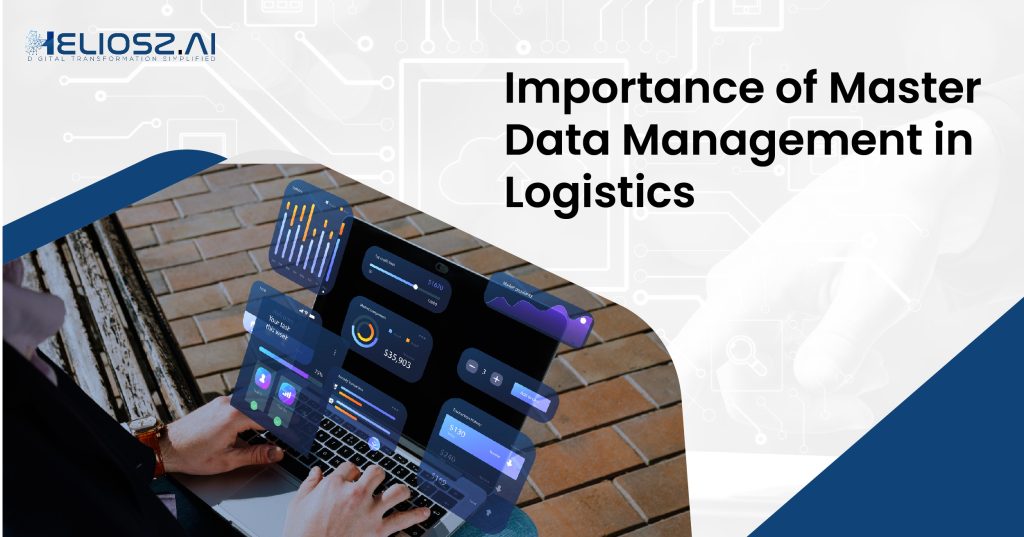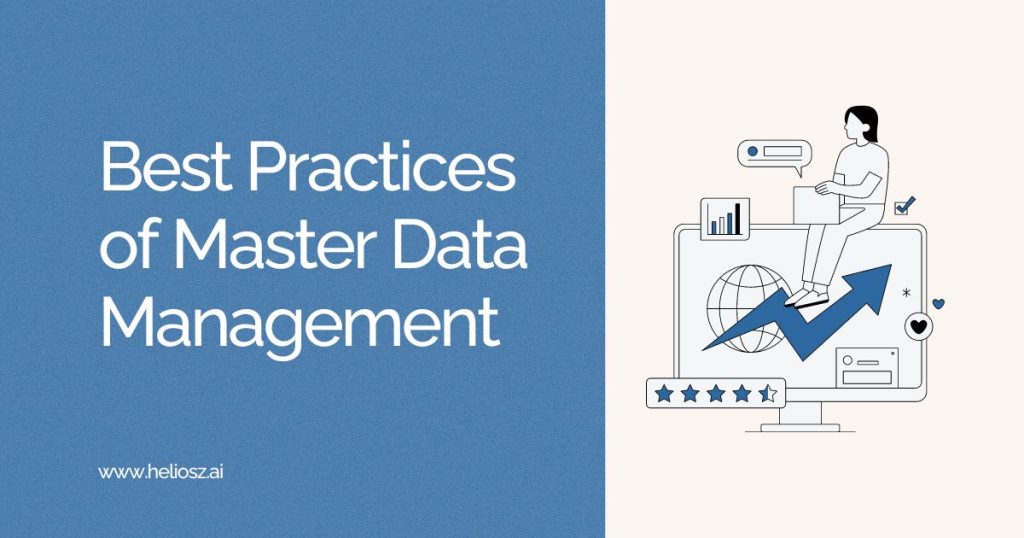
When the world enters an era where globalization and technological advancements are rapid and at an uncontrollable pace, the logistics industry is considered the cornerstone of global trade and commerce. This sector consists of a complex supply chain of transportation, warehousing, and inventory management which generates large amount of data that requires master data management to ensure accuracy and efficiency.
In such critical situations, the major determinant of success lies in the efficient management and utilization of data pools generated within supply chains in any logistics firm. Underpinning the data excellence of this sector lies only with the strategic implementation of Master Data Management (MDM).
Effective MDM practices ensure uniformity, accuracy, stewardship, semantic consistency, and accountability of master data assets in logistic operations.
Before diving into its significance in logistics, it’s essential to understand What is Master Data Management? and how it shapes business operations
No more ado let’s discuss the background of the logistics industry, the importance of MDM in logistics, and more in this article in detail.
Definition and Scope of Master Data Management
Master Data Management (MDM) is the complete name of processes and tools set in a special way to label, control, and automatically adjust vital business data—variably named as the ‘master data’—within a company.
This data includes customers, suppliers, products, and locations information, and serves as a single reference point for various business units and systems. The result is that MDM data opens up a common ground to acquire, consume, and integrate all organizational data without discrepancies and duplications, thus, data accuracy and consistency improve.
The logistics field, the MDM’s scope, is larger than ever. It involves the management of inventory, transportation, warehousing, and customer service data, which are all factors making the process of data management to the organization trouble-free with all of them operating from one accurate data source.
MDM is a critical service that facilitates the seamless transfer of data across the supply chain, thereby, logistics companies may utilize that opportunity to augment their operations and provide high-level customer experiences.
As per the latest survey conducted by McKinsey, 76% of organizations responded that they aim to achieve revenue growth by presenting better cross and upselling opportunities with more mature MDM.
Common Challenges Faced in Logistics
The logistics industry is a complicated sector of processes and operations that range over uncountable stakeholders, geographic locations, and technological systems. Here are a few key challenges that are inherent in logistics.
- Complexity in Supply Chain Processes
- Regulatory Compliance
- Data Silos and Lack of Data Integration
- Lack of Real-Time Visibility
- Issues with Data Accuracy and Consistency
- Impact of Poor Data Management on Operational Efficiency
McKinsey asked organizations what are the major data quality issues that your organization is currently encountering. And the issues are listed as incompleteness, inconsistency, inaccuracy, uniqueness, etc.
Want to reduce costs and improve data accuracy? Explore our Master Data Management solutions.
“In logistics, data is the new oil. Master Data Management refines it into a powerful tool for efficiency, accuracy, and growth.”
Importance of Master Data Management in Logistics
1. Enhancing Data Accuracy and Consistency with Master data management
Due to the complexity of supply chains in terms of logistics, companies are handling enormous data sets not only from suppliers and customers but also from their internal systems. The proper management of such data is necessary since if it is not properly managed, it will most likely get split up and become inconsistent, leading to errors and inefficiencies.
MDM offers a unified platform where all data is given common standards and tested for validity, thus, every piece of data is accurate and up-to-date. By implementing a unique source of information, MDM best practices take out uncertainties and alternatives. This helps in turning logistics into productive results.
2. Establishing a Single Source of Truth
By organizing and unifying the most important logistics data, an MDM adopts one genuine source of truth. This method gets rid of mistakes and duplications, so many people in all the departments can be sure that they have the same correct information.
Instead of that, let’s think of the mess that would be made if warehouses, carriers, and customer service representatives would each have different product descriptions or customer addresses. Order fulfillment would come to a stop and customer satisfaction would be extremely low.
The fact that MDM deletes these inconsistencies is the first important step toward giving a single version of logistics data needed for successful operations and wise decision-making.
3. Optimizing Inventory Management
Inventory management is the blood of logistics that supply chain professionals will never live without it. And MDM is very instrumental in this operation leading to efficiency. The master data management gives a 360-degree view of the stock, its location, and those who were working on the demand pattern of the product.
With this information, the logistics team can make decisions based on stock levels and warehouse space allocation which will help them make overall management plans and hence bring down the risk of stockouts that can lead to customer complaints and loss of customers.
Boost your logistics with Master Data Management. Contact us to see how we can help!
4. Supporting Compliance and Risk Management with Master data management
MDM completes the compliance process by offering data that is both accurate and consistent, and that can be brought into play in showing proof of conformity to industry standards as well as the rules and regulations put forth by the government.
This very feature determines the reason why it is relevant for those businesses that are dealing with their services in the world market under a difficult regulatory environment. Besides, MDM minimizes the risk by equipping companies with the needed data so one can detect and prevent potential risks.
As the data repository location is unified, MDM allows companies to evaluate and forecast suppliers, commodities, and market conditions, and then head off the risks that arise.
5. Facilitating Decision Making
Through the use of MDM, the decision-makers are provided with the base of data-driven decision-making by making sure that trustworthy and complete information is at their attention.
This ability is very much required in logistics where the decisions to do the routing, the inventory, and the supplier relationships can substantially change the costs as well as the service quality.
This is MDM where an LSP can monitor the data, spot the trends, and enter the prosaic side where the valuable information is present.
6. Enhancing Customer Satisfaction
In this customer-centric world, MDM contributes significantly to enhanced customer satisfaction by providing consistent and accurate order fulfillment on time.
Logistics companies can use reliable data available about products, customers, and orders to smooth order processing and lessen errors as well as to give customers the correct information for order tracking.
This way, IT support of the customer’s trust and transparency translates to increased customer satisfaction and loyalty.
7. Enabling Operational Efficiency
The efficiency of operations is the main factor that impacts the success of a company in logistics, and MDM stands out as a vital player in the effort to achieve this goal. MDM, by automating data integration and cleansing, lowers the amount of work that the staff should do manually for data management, thus reducing errors and freeing up resources for more strategic activities.
8. Considerable Cost Reduction
One of the most obvious benefits of MDM in logistics is the decrease in the costs the companies have to spend. Poor data management can lead to a variety of inefficiencies, among them overstock, late deliveries, inefficient routes, etc.
All of these would increase the cost of operations. Through MDM, companies can streamline manufacturing processes. This, in turn, results in the reduction of scrap and the utilization of resources to the maximum.
For example, companies can lower their holding costs and thus reduce the risk of running out of stock or overstock by having tighter inventory control levels with the eventual actual demand.
9. Supporting Emerging Technologies
The role of MDM is highly emphasized by the current situation of the extensively utilized technologies of IoT, AI, and blockchain in logistics.
The purpose of MDM is to verify that the data is correct and unchanging, and also that it is linked to other systems, allowing the logistics supplier to completely take advantage of an IoT based system.
On the contrary, the link between AI and machine learning tools and incremented productivity is at MDM’s end by bad data eliminating and ensuring the good data structure.
10. Data Governance and Security
The frequency of data breaches and issues of regulatory compliance keep increasing nowadays. That’s why MDM occupies a key position in the system of data governance and security.
This MDM system implements a put together style of managing data; it enables the organization of precise strategies and policies concerning data quality, access control, and data lifecycle management.
Through centralization of data management, MDM enables logistics companies to have full control over their data. The framework of governance not only contributes to the improvement of data quality but also shelters sensitive information from unauthorized access and breaches.
Role of Heliosz.AI in Master Data Management for Empowering Logistics Companies
Heliosz.AI, which is a pioneer in artificial intelligence and machine learning, offers a complete MDM solution that is designed specifically for logistics companies. The artificial intelligence solutions of Heliosz.AI are superior in data cleansing, enrichment, and harmonization by utilizing highly efficient algorithms.
Apart from that, Heliosz.AI makes it easy to quickly implement MDM initiatives thus enabling logistics companies to achieve better data management, which in turn leads to superior operational efficiency and better customer satisfaction.


